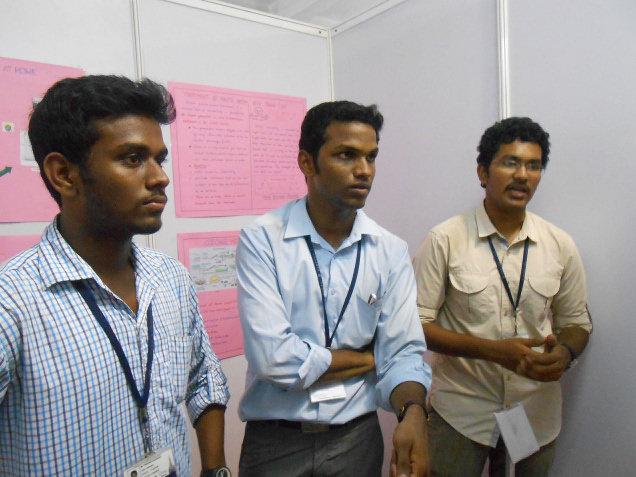
Students of Loyola College have devised a model that recycles grey water.
It is amazing how water shortage in Chennai has sparked a raft of school and college projects aiming solely at saving this precious liquid. The latest in this attempt is the award-winning grey-water recycling project by Sridhar Shankar, Thirunavukarasu M and Vaishnav Vasudevan, second year undergraduate Chemistry students at Loyola College, Chennai. “It was a nation-wide competition,” they inform me, “on Reduce-Reuse-Recycle,” and was held at Women’s Christian College (WCC).” They decided to participate the minute they came to know of it. “We were also inspired by Lily Christina (she teaches Chemistry to high-school students at St. Theresa School, Pallavaram), whose project on renewable sources of energy won the State-level award!”
Everyday resources
Zoning in on the theme took some scouting. They looked around to see how everyday resources like water got wasted because of our lifestyle. Then came the Eureka moment. “We found that we used a lot of water at the kitchen sink — cooking, washing dishes. This then went to waste. We opted to develop a project that would reduce-reuse-recycle that water,” the students said. Whatever the project was, it had to encompass a method and equipment that could be easily set up and used by everyone in their homes.
Support came from Principal Rev. Dr. G. Joseph Antonysamy and the Head of the Department of Chemistry, Dr. V. Alexander. “With the guidance of Professor in-charge Dr. S. Anuja Manikandan, we finalised the project — a method to remove impurities that enter water without spending too much money.”
Through blue-printing to the testing the prototype, the students were steered by one major thought: implementation of the project in ordinary households. The average home-maker should be able to carry out the process easily. Well, it won the first prize in the competition-cum-exhibition held in connection with the diamond jubilee celebrations at WCC. The award, handed over by the Mayor was Rs. 3,000 as cash and Rs. 2,000 in books. “Our project was praised for its message: do not waste fresh water.”
Managing waste water
Use water carefully, they say. Use a shower head; it distributes water, they recommend. And explain how you can recycle the water flowing down the kitchen sink. “It has organic (food) material from the dishes as well as oil/grease from typical Indian cooking. It also contains phosphates from the detergents used to clean the vessels.” The first step is to build a tank to trap the water. Remove the oil that floats occasionally, confine it to the compost heap. Any food particle present settles down. Separate it from the water. The remaining water is oxygenated using a small aquarium bubbler that allows the growth of algae. With this, 80 per cent of the impurities are gone. Why algae? During its growth it uses some of the phosphates from the cleaning liquids. It competes with other micro-organisms present and either kills them or uses them as nutrients.
Now filter the water to remove algae, and pass it through a sand filter containing ‘vettiver’ to get rid of the rest of the phosphates and to allow better (95 per cent) purification. Remember, the sand-filtered water is the same that drained from the kitchen sink. You can collect it and use it for gardening. Or use it for a fish tank and watch the fish eat up mosquito larvae and other harmful microbes. Or let it drain into the ground as is done in the rainwater harvesting system to recharge ground water. Collect this cleaned water in an inlet, pass it into a reverse-osmosis (RO) unit to get clean drinking water. If you can manage an industrial scale, treat it using ozone to disinfect and again use it as drinking water.
The major by-product for this process is the algae. Use it as manure. Put it in an anaerobic digester and produce methane. Use solar energy to run the digester. Make the whole process green.
The boys wish to thank all their classmates for “coming up with the different processes, especially Roy Immanuel and Sujeeth Kumar for their ideas on how the model could be built to perfection.” The cost was shared by the core group. They have been approached by architects who plan to include the method in their housing projects. “We would like to take it further after graduation.”
This is waste-water management, they say. It converts grey water into clean water with minimum fuss, at minimum cost. All you need is the will and some physical effort.
source: http://www.thehindu.com / The Hindu / Home> Features> Education Plus> Colleges / by Geeta Padmanabhan / December 01st, 2013